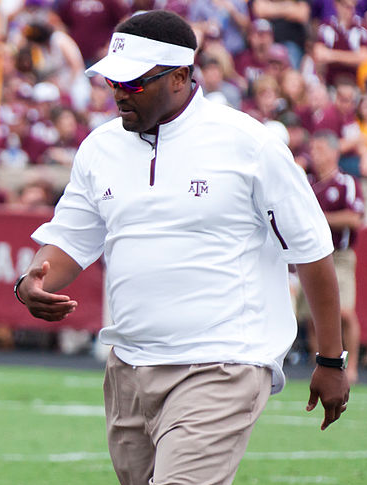Texas A&M's Kevin Sumlin Poised For College Football's Biggest Prize

A combined 22-3 record the last two seasons at the University of Houston and A&M? Check.
Beat Alabama, the then-No.1 team in the nation, in Tuscaloosa? Done.
Widely respected by his players and peers? You bet.
Is there any knock on the first-year A&M head coach?
Well, he hasn’t beaten Texas yet, although that has everything to do with money and nothing to do with Sumlin’s X’s and O’s.
But here’s something else that’s missing that Sumlin will soon be able to claim: becoming the first African-American head coach to win a national championship.
With all due respect to David Shaw, who’s doing a fine job at Stanford, Sumlin’s success at A&M in its first year in the Southeastern Conference points to someone who’s bound to break the last glass ceiling for African-Americans in college football.
His Aggies are 10-2 and No. 9 in the latest BCS poll, powered by the nation’s No. 3 scoring offense and led by freshman quarterback and Heisman Trophy candidate Johnny Manziel.
A&M is headed to the Cotton Bowl for a matchup against Oklahoma next month, and for the first time in a long time, it’s the Aggies taking up all the headlines in the Lone Star State and beyond.
If you were to visit College Station today, you could practically feel UT head coach Mack Brown’s envy coming in from Austin, and there’s little doubt that if Sumlin’s Aggies took on the Longhorns right now, that they would come out on top.
As exciting as this all is, the road to College Station wasn’t easy and there are still pitfalls ahead.
Sumlin was born in a deeply segregated Alabama in 1964. When he was two years old, his father, himself a high school football coach, moved the family north to Indianapolis to escape all that. Indianapolis wasn't paradise, but it offered more opportunities than Alabama ever would, and Sumlin ended up playing football and getting his degree at nearby Purdue.
Over the last 25 years, he's shot up the coaching ranks and, now, at age 48, Sumlin is the first African-American head coach at A&M—no small feat given that, like most other schools in the South, A&M didn’t accept minorities until the 1960s.
He’s also one of just 12 African-American coaches (and 16 minority coaches overall) at the Football Bowl Subdivision level, a pool that just got a bit smaller when Jon Embree got fired at Colorado after two seasons.
African-American coaches walk a fine line in college football; once they get fired, they typically don’t get rehired. Former Notre Dame head coach Ty Willingham is the lone exception, but he almost certainly needed the Rose Bowl win on his resume to get that second chance.
And worse, unlike the NFL, there’s no Rooney rule in college football that says a program has to interview at least one minority candidate.
Embree told the media after being fired that he knew going into the job that minorities don’t get second chances, but he added things would change eventually.
Expect that change to come a lot sooner when Sumlin wins a national championship and it won’t just be because of his game smarts, though he has plenty of that. He also happens to be a man of character and integrity, and a heck of recruiter, too.
His passion and energy for the game is contagious and you can see that this year at A&M. The people around him want to work and play hard for him.
Yes, Sumlin has had some luck along the way—neither Manziel at A&M nor Case Keenum at UH were his recruits, but to his credit, he saw something in them and made both into household names and winners.
Still, lots of UH fans were disappointed, if not angry, that he left the Cougars high and dry after nearly leading them to an undefeated season and a BCS bowl bid in 2011.
Except that’s not entirely true.
Sumlin left the program in far better shape when he came in four years earlier, which is really all you can ask from your coach. Now recruits want to play at UH and the school is starting construction this month on a new $105 million stadium that’s funded largely because of Sumlin’s success on the field.
But now the stakes are raised at A&M. The Cotton Bowl will do just fine this season—few people expected A&M to play spoiler, much less be a top-10 team, in its first year in the SEC.
Next year, though, especially if Manziel does well in the Heisman balloting, the expectations will be through the roof. The slightest slip-up will mean the honeymoon phase between Sumlin and A&M fans will end.
He’ll never admit it, but there’s a lot riding on what happens over the next few years. He’s just the third African-American head coach in SEC history and the first with a real chance to win a championship.
Success would mean going down as a hero well beyond College Station. Failure would mean being out of a job, and (sadly) a significant setback to minorities seeking jobs in college football.
No one deserves that kind of pressure. But we’re fortunate as college football fans and Americans that Sumlin is capable of handling it.
It won’t be this year, but Sumlin will take the Aggies to the promised land, and when he does, he’ll go down as the first, but not last, minority head coach to win a national championship.
Reach Staff Writer Salomon Fuentes here; follow him on Twitter here.



